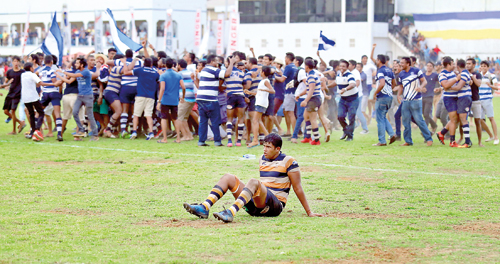Schools’ Rugby coaches on and off the field
View(s):
Coaches and supporters may be adamant to record wins, and the lessons of sportsmantship seem to be flowing slow among players - File pix
Schools, through its trusted disciples of Rugby, are making choices for coaches and, or advisors. Rugby in schools is a centre of focus and these decisions will have a telling effect on the life of children. In a background of shifting and moving coaches, as winning is illusive, there must also be consideration of the child as a whole.
Jeanne Goodese talking of coaching styles for kids, draws from Modern Theories of Leadership which identify Transactional and Transformational Leaders. “Transactional coaching is about exchange (or transaction) between a coach and a player to improve the immediate performance of the athlete. The bottom line is about winning and also highlights the glory of a coach and those around. This suits fine in the local environment of high spending and win seeking.
On the other hand, the Transformational coach strives to inspire and change (or transform) the whole athlete, not only to improve the individual’s sports performance, but also to positively affect change in the athlete’s life. This is about skills and techniques, motivation and behaviour, work ethic and sportsmanship – the transformational coach has the ability to positively affect, and to positively produce, the optimal sports performance of the team. Focus is to positively affect the performance of the team.”
What we do need is what will determine the choice.
I write, as there are echoes reverberating from the concrete jungles of Colombo and in the Hills, not only of coaches but others involved in the game, and of the deviant nature of behaviour in selecting the young. These include the exertion of pressure by those with vested interests offering places in teams in return for favours — the reward of money or personal services.
At the same time, others also include rabblerousers who design stones to throw, when their offspring do not find a place. It is time for schools to build a safeguard framework as in the Rugby Football Union (RFU).
The RFU ‘Safeguard Policy’ says that the RFU is committed to safeguarding the welfare of children in the sport. All children are entitled to protection from harm and have the right to take part in sport in a safe, positive and enjoyable environment.
Dr Priyanji De Soyza, in an article titled ‘The Current State of Affairs and Recommendations for the Future’, wrote in the ‘Child and Sexual Abuse Journal’, “Although the abuse of young schoolboys by teachers, sports coaches and hostel masters was and is no secret in schools, it was not discussed openly (de Silva, 2001a). Even today, there are those who “justify” sexual abuse and exploitation of boys, in Sri Lanka, by stating that “boys do not get pregnant” or “ships do not leave tracks on water,” without understanding (or not wanting to understand) the long term psychological effect.”
In September 2009, in this column, the Sunday Times said, “So what makes a good Rugby Coach? He should be able to gain Player Respect. That he does by selecting players for their talent and capability. That is the most important and the only principle. It should not be one of the three.”
The coach should have a good understanding of the game and build a relationship with players. A coach can be friendly, but they should not be friends with the players which lead to familiarity. This is where you need to be careful in selecting a coach for the young, where familiarity at times leads to abuse.
A coach needs to make decisions without bias, and the relationship a player or his parents has with the coach should not affect the player-coach relationship. That is where you have to avoid people who practise the second of the 3 principles. That is how deep the parents pocket is and how much they are willing to spend. The coach must be somebody who gets teams to play to their strength.
The coach should be working on strategy capable of being put into operation by determining the strengths and weaknesses of players. This will involve the organisation and execution of skills during a game, in response to recurrent situations. Any choice of strategy has a relationship to selection and selection policy. Where you select the best players available and decide and select players to implement. Selection should be based on strengths or “star quality”.
 Sri Lankan Junior Sport: It is no secret that, there are forms of deviant behaviour. Rugby is no exception, as has been occasionally expressed, this behaviour is thought as being normal.
Sri Lankan Junior Sport: It is no secret that, there are forms of deviant behaviour. Rugby is no exception, as has been occasionally expressed, this behaviour is thought as being normal.
I say this, as the present President of Schools Rugby Ranjith Chandrasekera is working along with the SLR and it’s Technical Committee towards having a framework to ensure that schools have accredited coaches.
This might cause a ripple in people taking issue, asking whether coaches who have performed have been accredited, because to them it is the piece of metal that is important. What needs to be understood is that, it is not about being accredited to win matches but, having followed a system that ensures the core values of the game TEAMWORK, DISCIPLINE SPORTSMANSHIP, RESPECT and ENJOYMENT. It is about Transactional and Transformational leadership.
The age old statement “Boys will be boys” or “this happened during our time” has to be mixed with thoughts on LGBT being openly discussed. That probably understands diversity. But what cannot be understood or left to subtle interpretation is when it becomes harassment or abuse by adults in positions.
This must be built into the curricula of Rugby training at schools. Not necessarily by compulsion but, more through understanding – every school has a responsibility to get the right man to teach children and, or advise and build the framework, so that you know what is in and what should be out.
Vimal Perera is a former Rugby Referee, Coach and an Accredited Referees’ Evaluator IRB


